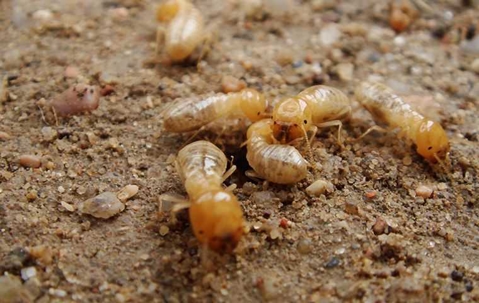At The PEST Group, our termite removal team specializes in developing customized solutions. While taking the one-size-fits-all approach is not an effective way to get rid of termites in Los Angeles, there are a few things every homeowner can try to reduce their chances of having a termite problem in the first place.
Signs Of Termites: How To Detect And Underlying Problem
In Los Angeles, our termite exterminators must deal with drywood and subterranean termites. As their name suggests, drywood termites in Los Angeles like to consume wood that doesn’t have a lot of moisture. They will typically build their nests inside whatever wooden surface they consume. If they can find their way inside your house, you will likely find evidence of them around furniture, baseboards, door frames, structural wooden beams, and even the wooden siding on your home.
Subterranean termites have slightly different behaviors than their drywood relatives. This species requires a lot of water and moisture. They prefer to consume damp and rotted wood, and their bodies must have a certain amount of moisture, or they will die. In fact, subterranean termites live underground inside damp soil. If they leave their nests, most will be required to build and travel through mud tubes to ensure their bodies don’t dry out.
If you see long and thin mud tubes that look as if they are stuck to the exterior walls of your home, you likely have a subterranean termite infestation. You should have your property inspected by an experienced termite inspector.
Understanding The Termite Threat: What You Need To Know
Despite their small size, termites can cause a significant amount of damage to your home. They live in large colonies that can contain more than 500,000 termites, and they are constantly eating. They mainly eat wood, but they can eat other plants as well. If they decide to snack on the wood in your home, some of the damage you might see could include:
- Holes in the drywall
- Soft or brittle wooden surfaces
- Buckling floorboards
- Sagging ceilings
- Jagged and destroyed wood surfaces
- Bubbling and peeling paint
If you have a mild or young termite infestation, you are likely only to notice minor cosmetic damage to your house. However, this is the time when you should call an experienced termite exterminator to prevent any structural damage to your home.
Why DIY Termite Control Can Do More Harm Than Good
Getting rid of a termite infestation requires a certain level of expertise. To completely eliminate a termite infestation, you will need to know how severe the infestation is, and you will need to be able to locate all of the access points leading to the termite nest. An experienced termite removal expert should be able to do both things.
If you choose to purchase a DIY termite control solution over the counter, you could end up making the problem worse. First, you likely won’t be able to gain access to all of the termites in the colony. Also, the termite treatment options found in stores are usually not strong enough to eradicate all termites. They will typically force the termite deeper into the colony, where it will continue to thrive, eat, and reproduce.
Say Goodbye To Termites! Call Our Expert Team Today
If you are looking for complete termite control in Los Angeles, look no further than our professionals at The PEST Group. Termites don’t stand a chance against our experienced technicians and advanced solutions.
Give us a call today to schedule your no-obligation inspection.
Our certified pest experts will work with you to find the best solution for your needs. Simply fill out this form for a free, no-obligation estimate.

